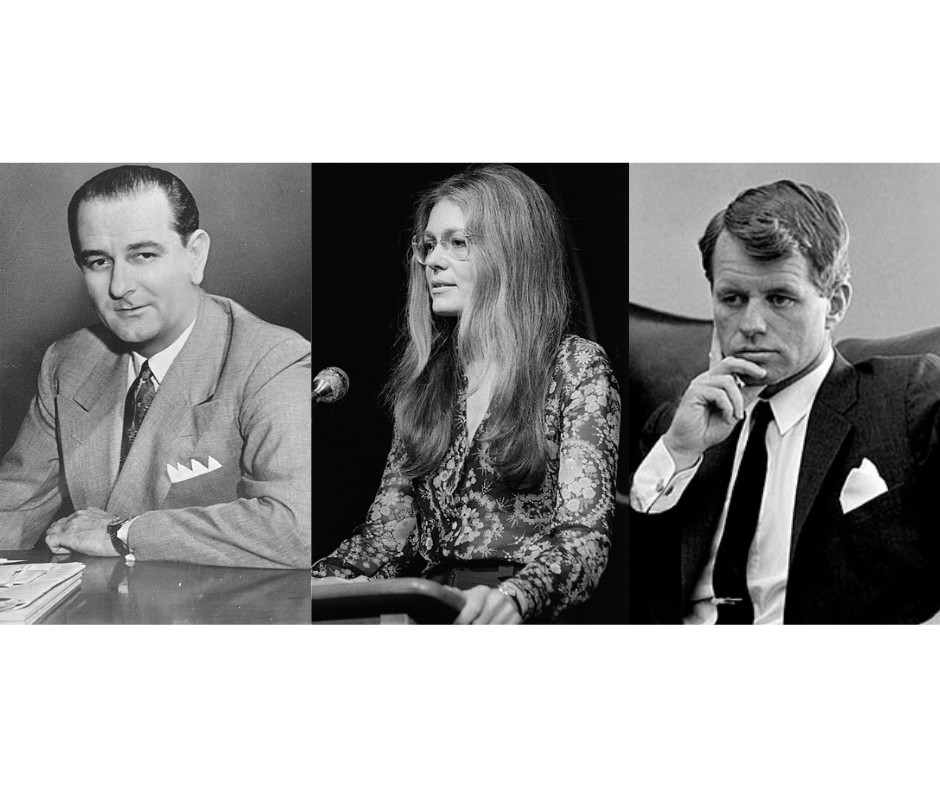By Tom Deegan,
History is bunk, said Henry Ford.
I knew both of them. Herewith, my version of history.
Turning back the clock can be tricky business, always influenced by telling a story that supports the present. And, turning back the clock to the tumultuous year of 1968 is particularly dicey. Student protests on campuses, a war in Vietnam, a police riot in Chicago, assassinations of Martin Luther King and Robert Kennedy, recent Civil Rights legislation being put to the test in the South by independent candidate, George Wallace (Segregation now, segregation tomorrow, segregation forever!), and activist, Gloria Steinem, announcing that women were no longer sex objects and had to be seen as the equal to men. Say what?
The Gloria Steinem I had seen in action (still at large, by the way, at 91 years of age) tried to seduce Bobby Kennedy, attaching herself to him shamelessly on an upstate campaign swing in his 1964 race for a NY Senate seat . . . done up to the nines with mod goggles, a hip high mini skirt, bare legs and a formfitting jersey advertising the new fashionable braless look. Must have been Gloria’s evil twin.
I was six years younger than Gloria Steinem at 26 years of age. Of no consequence as a journalist or a political operative, I was an errand boy for the Kennedy campaign . . . an invisible position that provided a front row seat to history.
In the background of the cookie cutter quality of most 21st Century politicians both Lyndon Baines Johnson and Robert Kennedy stand out as interesting figures, particularly in their rivalry.
One evening in the Presidential Election of 1960–Johnson running for VP with Jack Kennedy at the head of the ticket–made a visit to our Greenwich, Conn, home in to meet with media moguls. This was a perfect setting for LBJ. He was confident and articulate chatting up small groups. By contrast, Bobby choked in this kind of setting. He was much more comfortable in front of Columbia students one night when I was handling the press bus and got to watch him field questions with ease. Shy by nature, Bobby Kennedy had what we would we would assess today as, poor social skills. He became tongue tied. Once, sitting in his Senate office, he had me bring him up to date on Berlin where I was stationed in the US Army. Asking question after question was his mode of interaction to compensate for his inability to make the kind of small talk that lubricates a normal conversation. He was a better listener than speaker and stored vast quantities of information in his deep memory
Both were secretive, old-time politicians . . . as was then the fashion. The public persona was a deliberate construct and bore only fleeting resemblance to the private person. As was the prerogative of high office, both enjoyed the company of women outside of their marriages to faithful wives who looked the other way . . . a Renaissance comfort in life for men of affairs, in our present culture roundly disparaged as a personality flaw.
Natalie Cushing was Bobby Kennedy’s long-time mistress. Natalie was only a few years older than I—in her late twenties—and I knew her Newport family from a prep school near Newport, RI, where her brother-in-law and I both played the position of pass receivers on the Junior Varsity football team. Natalie felt comfortable with me as I squired her around the five boroughs of New York City in my Pontiac convertible following the campaign trail. She was wild about the boy.
By all accounts, Lyndon Johnson was less discriminating. Doris Kearns—later biographer of Abraham Lincoln and Franklin Delanor Roosevelt as Doris Kearns Goodwin—tells the story of being down at LBJ’s Texas ranch on the Pedernales River, as a young intern, when LBJ slid into her bed and announced, Move over, honey, it’s your President.
Both Kennedy and Johnson had amazing recall, and kept files of their political grudges. In fairness, that is the way politics was conducted back then. Compared to their hardball politics, Donald Trump’s world today would look like a fraternity dinner at the Kiwanis Club . . . with what the modern media authorities characterize as his, vindictiveness. For instance, Bobby despised writer Gore Vidal, probably because Gore Vidal, who moved in JFK’s Palm Beach/Newport social circles, knew too much about Jack Kennedy’s late night adventures. For obvious reason, both these figures—LBJ & RFK—put a high premium on discretion. Leaks from either camp were few and far between.
Politics for both was paramount. In 1964 Bobby was not getting traction in his campaign to unseat the popular incumbent, Kenneth Keating. LBJ came to town and spent a day on the campaign trail with Bobby, laying down the law with local New York pols suspicious of the Massachusetts carpetbagger in their midst. All in a day’s work. Bobby was publicly and privately appreciative. He—Bobby—had roughed up Lyndon Johnson at the 1960 Democratic Convention. From what I observed, while team Kennedy and team Johnson were wary of each other, the principals, to a large extent, saw all this as just part of the game.
Tom, that David Halberstam is a burr under our saddle! LBJ told my father at a fundraiser in New York a month before Jack Kennedy’s assassination. I was a mute presence to the chat. The Vice President could just as easily have used the opportunity to gripe about being sidelined by President Kennedy, but he remained loyal.
Both politicians were very good vote counters. At the Los Angeles Democratic Convention of 1960, Bobby had stationed himself with the Wyoming delegation as the critical nomination vote was tallied. He knew from his calculations that his brother would go over the top when Wyoming was called towards the end of the alphabet. Johnson’s skill as a master headcounter when he ran the Senate as Majority Leader was legendary.
When Bobby was shot after a primary win in California, LBJ immediately put the White Houde switchboard at the disposal of Steve Smith, Bobby’s brother-in-law (married to Jean Kennedy ) for Steve to make funeral arrangements from his corner suite in the heights of the PanAm skyscraper overlooking the Hudson River. Because I was managing the storefront headquarters on 38th Street I was almost daily in Mr. Smith’s office talking about buttons, bumper stickers, the various committees that sprouted up by heavy hitting NY activists of every sort, disposition of the off-duty NYPD detectives who ran the motor pool, as well as the new innovation of a call center to canvass registered Democrats that my old friend, Bobby Steinberg, had set up. My brother, Nick Deegan, and Marina Forstmann Day, to whom I was married at the time, were lending a hand as well.
Early on in 1968, Mr. Smith had me go over to see the NY State Election Commissioner, Maurice O’Rourke, to get prints-out of Registered Democrats that the call center could work from.
Oh, no, Tommy. These are official records and cannot be used for partisan purposes, he patronized me in his polished Irish brogue.
I backed out of the Commissioner’s spacious New York State office, making my way over to Steve Smith’s office to break the bad news.
Steve stomped the twentieth cigarette of the morning in an overflowing ashtray of snubs and, ordered, Go get them!
A make-or-break moment for my incipient political career.
Commissioner, I need those prints-out . . . as in, cut the bullshit, Maurice.
Of course, Tommy, he submitted.
So, my first felony on behalf of the Kennedy machine and a made man all in the very same morning.
LBJ and Bobby Kennedy understood each other very well. Both were excellent practitioners of a trade then firmly in the hands of an exclusive cohort of journalists, elected officials and big city bosses . . . and well before mass media saturation, the internet, podcasts, webinars and the terrible blights of transparency and inclusion, not to mention the arrival of talented freelancers such as Bill Clinton and Barack Obama.
These guys—LBJ & RFK– were both consummate Party-politics professionals.
Or, as Mario Puzo’s Godfather would have it, nothing personal.
About the Author: Tom Deegan, the author was a nurse traveler in the South West for 15 years and wrote Healthcare . . . a View from the Trenches about his experiences. Mr. Deegan grew up in a very political Irish family from Brooklyn and saw many of the political greats of the 1960s up close as he worked behind the scenes on Robert F. Kennedy’s 1968 Presidential campaign setting up his campaign office in Manhattan.
Mr. Deegan’s father, Thomas J. Deegan Jr., was named by New York City Mayor Robert F. Wagner as the chairman of the New York World’s Fair Corporation in 1959 and worked closely with Robert Moses to launch its opening on April 23, 1964. The World’s Fair ran for two six-month seasons and attracted 51 million paid admissions.







